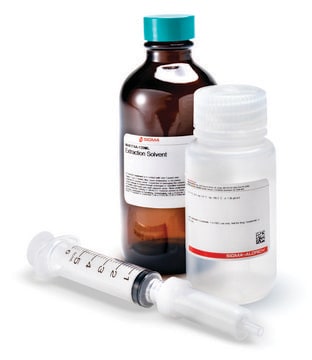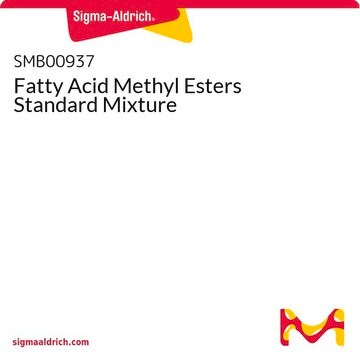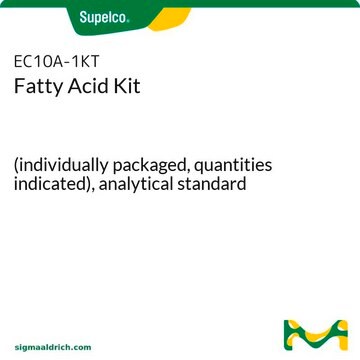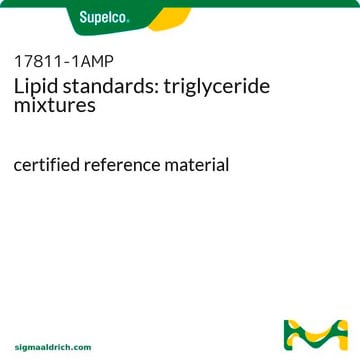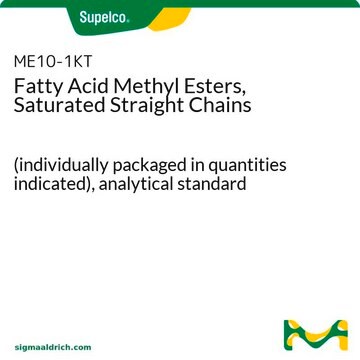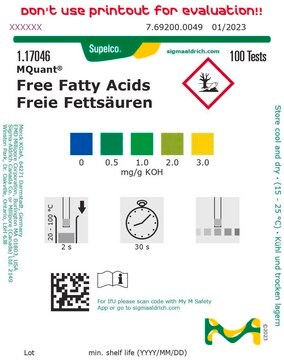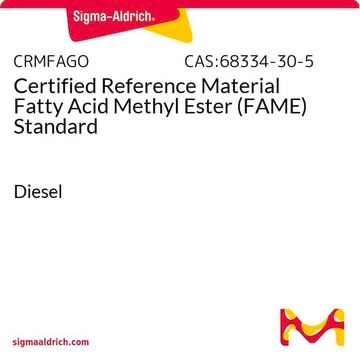MAK338
Fatty Acid Extraction Kit, High Standard
sufficient for 40 extractions
Synonym(s):
Lipid Extraction Kit
About This Item
Recommended Products
usage
sufficient for 40 extractions
greener alternative product characteristics
Waste Prevention
Learn more about the Principles of Green Chemistry.
sustainability
Greener Alternative Product
input
plasma
food(s) (oil)
blood
tissue extract(s)
food(s)
serum
application(s)
cosmetics
food and beverages
sample preparation
greener alternative category
relevant disease(s)
cancer
storage temp.
room temp
General description
When extracting fatty acids at normal or high levels, such as in food matrices, use the MAK338 Fatty Acid Extraction Kit. This kit produces stronger signals. When extracting fatty acids at low or very low levels, such as in cellular matrices, use the MAK174 Fatty Acid Extraction Kit. If in doubt about which kit to use, use MAK338. The Folch method has been conventionally used to extract lipids containing fatty acids from biological samples, using chloroform, methanol, and water to separate lipids from aqueous-soluble compounds. In this procedure, lipids are retained in the lower chloroform layer; whereas, aqueous-soluble compounds are retained in the upper methanol-water layer. The sample is then centrifuged to achieve uniform separation and the bottom chloroform layer is transferred with a pipette to a new test tube.
The Fatty Acid Extraction Kit shortens this extraction process by eliminating the need to prepare solvents and standards, centrifugation, and pipetting. Once the sample is homogenized and dissolved in the Extraction Solvent supplied in the kit, it is inverted twice and poured into the syringe containing a filter, which preferentially elutes the chloroform layer containing total lipids. A portion of the total lipid extract containing fatty acids can then be transesterified for GC-FID analysis.
We are committed to bringing you Greener Alternative Products, which adhere to one or more of The 12 Principles of Greener Chemistry. This product reduces solvent waste over traditional methods. Find details here.
Application
- Lipid Analysis
- Lipidomics Research
Features and Benefits
Suitability
Other Notes
related product
Signal Word
Danger
Hazard Statements
Precautionary Statements
Hazard Classifications
Acute Tox. 3 Inhalation - Acute Tox. 4 Dermal - Acute Tox. 4 Oral - Aquatic Chronic 3 - Carc. 2 - Eye Irrit. 2 - Flam. Liq. 2 - Repr. 2 - Skin Irrit. 2 - STOT RE 1 - STOT SE 1 - STOT SE 3
Target Organs
Central nervous system, Eyes, Liver,Kidney
Storage Class Code
3 - Flammable liquids
Flash Point(F)
95.0 °F
Flash Point(C)
35 °C
Regulatory Listings
Regulatory Listings are mainly provided for chemical products. Only limited information can be provided here for non-chemical products. No entry means none of the components are listed. It is the user’s obligation to ensure the safe and legal use of the product.
PDSCL
Please refer to KIT Component information
PRTR
Please refer to KIT Component information
FSL
Please refer to KIT Component information
ISHL Indicated Name
Please refer to KIT Component information
ISHL Notified Names
Please refer to KIT Component information
Cartagena Act
Please refer to KIT Component information
JAN Code
キットコンポーネントの情報を参照してください
Choose from one of the most recent versions:
Certificates of Analysis (COA)
Don't see the Right Version?
If you require a particular version, you can look up a specific certificate by the Lot or Batch number.
Already Own This Product?
Find documentation for the products that you have recently purchased in the Document Library.
Customers Also Viewed
Our team of scientists has experience in all areas of research including Life Science, Material Science, Chemical Synthesis, Chromatography, Analytical and many others.
Contact Technical Service